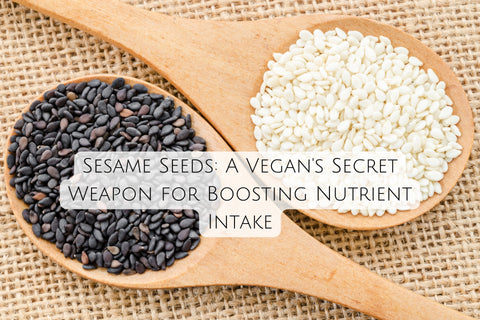In the realm of plant-based nutrition, sesame seeds emerge as a tiny yet mighty powerhouse, offering a plethora of essential nutrients and health benefits. While often overlooked, these tiny seeds pack a punch when it comes to boosting the nutrient profile of vegan diets. Join us as we delve into the world of sesame seeds, uncover their nutritional treasures, and explore creative ways to incorporate them into your plant-based meals.
Sesame Seeds Unveiled: A Nutrient-Rich Superfood

Sesame seeds, tiny and unassuming, are nutritional powerhouses brimming with health benefits. Cultivated for millennia, these little seeds boast an impressive profile of essential nutrients, making them a valuable addition to a balanced diet. Let's delve into the world of sesame seeds, exploring their nutritional value, potential health benefits, and delicious ways to incorporate them into your meals.
A Nutritional Powerhouse in Every Bite:
Sesame seeds are a concentrated source of various nutrients:
- Healthy Fats: Rich in polyunsaturated and monounsaturated fats, including the beneficial omega-6 and omega-9 fatty acids.
- Plant-Based Protein: A good source of plant-based protein, important for building and maintaining muscle tissue.
- Fiber: Provides dietary fiber, aiding digestion and promoting gut health.
- Vitamins and Minerals: Sesame seeds are a good source of vitamins and minerals like vitamin B1 (thiamine), vitamin E, magnesium, calcium, iron, and zinc.
Plant-Based Protein Powerhouse: Meeting Your Protein Needs

Here are some plant-based champions brimming with protein:
- Legumes: Beans, lentils, and chickpeas are all excellent sources of protein and fiber. A cup of cooked lentils packs around 18 grams of protein! Enjoy them in soups, stews, salads, dips (hummus anyone?), or curries.
- Tofu and Tempeh: Made from soybeans, these versatile options offer a complete protein profile, meaning they contain all nine essential amino acids. Tofu can be crumbled, cubed, or sliced to fit various recipes, while tempeh has a firmer texture, great for grilling or pan-frying.
- Nuts and Seeds: Almonds, walnuts, pistachios, hemp seeds, and chia seeds are protein powerhouses in a smaller package. Enjoy them by the handful as a snack, sprinkle them on salads or yogurt parfaits, or use nut butters (made from 100% nuts) as a spread or in smoothies. Remember, nuts and seeds are also calorie-dense, so enjoy them in moderation.
- Grains: While not the most protein-dense option, whole grains like quinoa, oats, and brown rice contribute a good amount of protein, especially when combined with other protein sources.
Calcium-Rich Source: Building Strong Bones

Calcium is the most abundant mineral in the human body and plays a vital role in bone health. It helps build and maintain strong bones and teeth, and also regulates muscle function, nerve transmission, and blood clotting.
One tablespoon of sesame seeds boasts about 87 milligrams (mg) of calcium. While this may seem like a small amount compared to dairy products, it's a significant contribution for those following a plant-based diet or looking to limit dairy intake.
Heart-Healthy Fats: Nourishing Your Cardiovascular System

One ounce (around 3 tablespoons) of sesame seeds provides about 5 grams of monounsaturated fats and 4 grams of polyunsaturated fats. These healthy fats can offer several heart-protective benefits:
- Lowering LDL Cholesterol: Studies suggest that sesame seed consumption may help reduce LDL cholesterol levels, a major risk factor for heart disease.
- Reducing Blood Pressure: Some research indicates that sesame seeds might have a blood pressure-lowering effect, potentially benefiting cardiovascular health.
- Antioxidant Power: Sesame seeds are rich in antioxidants, which fight free radicals that can damage cells and contribute to heart disease.
Fiber-Rich Goodness: Supporting Digestive Health

While sesame seeds can be a helpful source of fiber, it's important to include a variety of fiber-rich foods in your diet for optimal digestive health:
- Fruits and Vegetables: Fill your plate with a colorful variety of fruits and vegetables, all excellent sources of fiber.
- Whole Grains: Opt for whole grains like brown rice, quinoa, and whole-wheat bread over refined grains, which are lower in fiber.
- Legumes: Beans, lentils, and chickpeas are not only a great source of plant-based protein but also provide a good amount of fiber.
Antioxidant Protection: Fighting Free Radicals

Sesame seeds are brimming with several antioxidant compounds, including:
- Sesamol: This unique antioxidant found abundantly in sesame seeds has been shown to possess anti-inflammatory and cell-protective properties.
- Sesamin: Another powerful antioxidant in sesame seeds, sesamin may help reduce oxidative stress and protect against chronic diseases.
- Lignans: These plant compounds with antioxidant properties found in sesame seeds may offer benefits for heart health and certain cancers.
Creative Culinary Uses:

Sesame seeds offer more than just textural flair. Here are some sesame seed products to explore:
- Tahini: This creamy paste made from sesame seeds is a delicious and versatile ingredient. Use it in hummus, dressings, sauces, dips, or even as a spread on sandwiches.
- Sesame Oil: Sesame oil, with its nutty aroma, can be used for drizzling, stir-frying, or adding a touch of Asian flair to your dishes. Choose toasted sesame oil for a more robust flavor.
In conclusion, sesame seeds are a vegan's secret weapon for boosting nutrient intake and enhancing the nutritional quality of plant-based diets. With their rich array of vitamins, minerals, and antioxidants, sesame seeds offer a convenient and versatile way to nourish your body and support overall health and well-being. So, embrace the power of sesame seeds and elevate your vegan meals with their delicious and nutritious goodness.




Comments (0)
There are no comments for this article. Be the first one to leave a message!